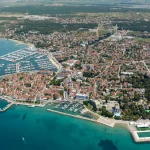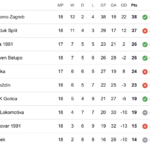There is much more to it than one could guess by watching “Baywatch”, it is a tough course, designed to train lifeguards to tackle even the most demanding tasks.
When you first think of a role of a lifeguard, you might think it is nice and pleasant work for young people looking for a summer job – walking around the beach, looking good and taking a few swims. Guess again. As new lifeguards are taking the course to get their official license in Dalmatia, on May 21, 2016, we visited them at the Žnjan Beach and talked to Tanja Marinković, Lifeguard Instructor of the Croatian Red Cross in Split.
Can anyone take the course to become a lifeguard?
There are requirements set by the International Life Saving Federation to even be considered for the course. First, one has to be able to swim 400 meters in the time of 8 minutes, and be able to dive trough the entire length of a 25-metre pool. One has to be 18 years old and have a good swimming technique. During the course, students have to pass the full first aid exam.
It does not look that hard…
(laughing) Try it… One out of three applicants fail the first test; it looks easy on paper, but swimming is much harder than it seems, and the course itself is really tough. Students have to learn all the lifeguarding techniques, they have to be able to carry an adult person out of the water, and there is a two-mile swim they have to do in the process. And that is just the small part of it all. The course consists of three main lessons; first aid, ecology, and lifeguarding techniques. There is much more to it, as the focus is on prevention, so they have to be good in teamwork and learn a lot about social skills.
Ok, I’m out. Is it a requirement to be young and beautiful?
It does not hurt. Joking aside, most of the licensed lifeguards are in their twenties, as it is hard work, with a lot of sun exposure, and it is a rare case that someone stays in business for more than ten years. That is why we have courses every year, and as for our Dalmatian branch of the Red Cross Life Saving Association, we have courses in Dubrovnik, Split, Šibenik, and Zadar, with some 60-70 new lifeguards trained every year. And, actually, we had one fifty-one year old getting the license on the last course in Split.

So, there is still time for me to get in shape and try?
To be fair, that man is an ex-Olympian, and ex-Yugoslav Swimming Champion, Hrvoje Barić Grop, so he had a starting advantage, but the curiosity was that he was taking the course together with his son.
I do not see a lot of female students?
There are not too many female lifeguards, but ones that finish the course tend to be among the best. After all, there are three life-guarding instructors in Split, and two of those are women. And in this particular course in Split, we have one girl from the Czech Republic, who is here on student exchange, and she decided to spend her summer in Dalmatia working as a lifeguard.
What does a lifeguard do during the winter?
Well, there are always swimming pools open, but apart from the lifeguarding itself, lifeguards organize courses in kindergartens and elementary schools, teaching children about the Code of Water Safety. The youngest ones have a lot of fun in the process, and as they take some knowledge about the code, we are happy to provide help for them. It is a part of our effort to raise awareness about the significance of prevention. Also, we have the workshop “accidental lifeguard”, teaching adults what to do in case of the accident, and we have swimming courses, as well as the junior lifeguard training.
What is the toughest task while working as a lifeguard?
Well, sometimes it is hard to explain to people that some things can be dangerous, as a lot of tourists, and what is more surprising, even the locals do not take the power of the sea seriously. As we point out to them, it is not a grand idea to take the floating device in Split and try to reach Brač, we sometimes get the weirdest answers. And those people usually have a pint too much before undertaking that kind of adventure.
While looking at the training of the future lifeguards, we got more appreciative of the work they do. If you see people in red shorts and yellow shirts on the beach this summer, pay attention to their announcements, as they are there for your safety.











